Exodus Blu-ray Movie
HomeExodus Blu-ray Movie 
Limited Edition to 3000Twilight Time | 1960 | 208 min | Not rated | Mar 15, 2016
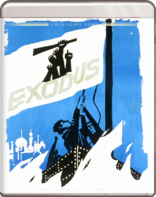
Movie rating
6.4 | / 10 |
Blu-ray rating
| Users | 3.0 | |
| Reviewer | 3.5 | |
| Overall | 3.3 |
Overview
Exodus (1960)
The theme is the founding of the state of Israel. The action begins on a ship filled with Jewish immigrants bound for Israel who are being off loaded on Cyprus. An Intelligence officer succeeds in getting them back on board their ship only to have the harbor blocked by the British with whom they must negotiate. The second part of the film is about the situation in Israel as independence is declared and most of their neighbors attack them.
Starring: Paul Newman, Eva Marie Saint, Ralph Richardson (I), Peter Lawford, Lee J. CobbDirector: Otto Preminger
| War | Uncertain |
| History | Uncertain |
| Drama | Uncertain |
| Action | Uncertain |
Specifications
Video
Video codec: MPEG-4 AVC
Video resolution: 1080p
Aspect ratio: 2.34:1
Original aspect ratio: 2.20:1
Audio
English: DTS-HD Master Audio 5.1 (48kHz, 24-bit)
English: DTS-HD Master Audio 4.0 (48kHz, 24-bit)
English: DTS-HD Master Audio 2.0 Mono (48kHz, 24-bit)
Music: DTS-HD Master Audio 2.0 (48kHz, 24-bit)
Subtitles
English SDH
Discs
50GB Blu-ray Disc
Single disc (1 BD)
Playback
Region free
Review
Rating summary
| Movie | 3.5 | |
| Video | 3.0 | |
| Audio | 4.0 | |
| Extras | 1.5 | |
| Overall | 3.5 |
Exodus Blu-ray Movie Review
So close and yet so far.
Reviewed by Jeffrey Kauffman March 28, 2016It may seem like ancient history now, but the State of Israel had been in existence for barely ten years when Leon Uris’ Exodus became the biggest phenomenon the publishing world had seen since Gone with the Wind. Ironically, the Margaret Mitchell tome had been about the (temporary) dissolution of a nation, while Exodus charted the birth pangs of one of the most epochal “creations” of modern times. The controversies that attended the founding of Israel may have been fresher in 1958 when the novel appeared, but were in some ways perhaps curiously less acute than they seem to be nowadays, which in turn makes Otto Preminger’s 1960 film version of the tale so fascinating, albeit in sometimes unexpected ways. When the film debuted right before Christmastime in 1960, becoming an instant sensation not just at cineplexes but also on the airwaves due to the towering presence of Ernest Gold’s massively popular theme, it seemed in its own way (despite it being an ostensible "historical" film) to carry a spark of “newness”, a (forgive the reference) Genesis story of sorts that seemed to catch the same zeitgeist which had just won John F. Kennedy the presidency. The heroic struggle to forge something meaningful out of the ashes of World War II found its own refracted reflection in the generational shift that was occurring in the United States, as the children of the “greatest generation” were themselves trying to create a contemporary vision that sought to escape the strictures of the past (in this case, the supposedly stultifying fifties). Exodus can be seen now as having appealed to the same youthful exuberance that helped inform early sixties efforts like the Peace Corps, though of course the source of Uris’ novel could have hardly been less peaceful. Still, there’s a distinctly early sixties optimism to Exodus which helps it overcome an at times melodramatic mien which some historians have found less than helpful in explicating the long and roiling history which ultimately paved the way for the State of Israel.
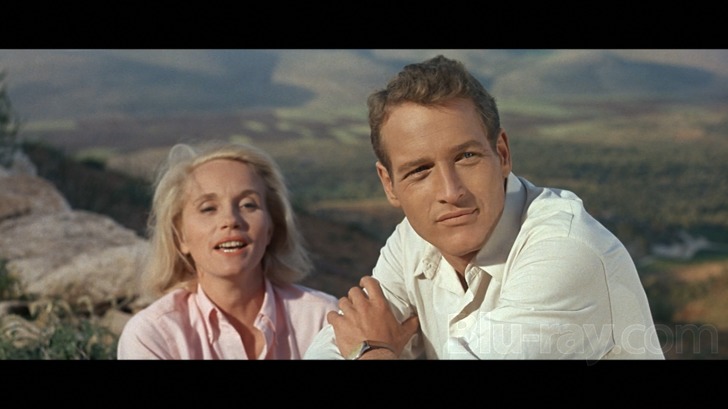
Part of that perhaps slightly odd “contemporary” feeling (meaning, circa 1960 instead of the film’s 1947 timeframe) is on display from virtually the first moment, as nurse Kitty Fremont (Eva Marie Saint) is introduced on a scenic hillside on the island of Cyprus overlooking an impossibly gorgeous Mediterranean Sea. There’s very little to suggest a late forties era, something that continues to inform the film for at least its first few moments, until Kitty’s first “interaction” with the teeming population of Jewish refugees who are being held prisoner (more or less) by the British on the island. In her tourguide’s car, Kitty is made aware of the roiling situation, and initially at least doesn’t seem to want to be bothered, asking instead that her chauffeur take her to the home of General Sutherland (Ralph Richardson), a friend of Kitty’s late husband. Sutherland, the very model of a modern major (or at least brigadier) general, is an upper crust sort, though his adjutant Major Caldwell (Peter Lawford) lets it slip to Kitty that Sutherland may have Jewish ancestry, an early “tell” (literally and figuratively) that reveals a certain British ambiguity about Jews which will continue to figure into the plot.
Kitty’s conversation with Sutherland reveals her traumatic past (one which is at least somewhat different than the one detailed in Uris’ original novel). Though she has plans to move on from Cyprus within just a few days to pursue a world tour and perhaps forget her problems, Sutherland encourages her to use her nursing skills to aid in the huge refugee camp holding Jews. After Caldwell’s snarky comment about Sutherland’s ancestry, Kitty reevaluates her initial demurral and agrees to help out as she can. That in turn introduces her to several supporting characters, including young Karen Hansen (Jill Haworth). Karen herself provides an entrée to another character who has been briefly seen in the previous sequence with Kitty in her tour car, a young rabble rouser named Dov Landau (Sal Mineo).
Meanwhile, Ari Ben Canaan (Paul Newman), a veteran of Britain’s so-called Jewish Brigade in World War II, sneaks onto Cyprus to hatch what seems like a patently mad plan: he wants a Cypriot named Mandria (Hugh Griffith) to arrange for a cargo ship which Ari wants to fill with human cargo, namely 611 of the refugees being held in the detention camp. Ari’s ultimate goal is to get the refugees to Palestine (as it was still being called), though he’s not naive enough to think that getting there is going to be easy. And in fact much of Exodus’ early going details the obstacles the British erect even after the ship (called Exodus) is filled to its brim with Jews wanting to forge a new life for themselves in the “promised land”.
The first part of the probably excessively long Exodus (two hours before the intermission, with another hour plus afterward) takes place on the crowded freighter as it’s stuck by Cyprus, a fact which ends up breeding illness and even death. The screenplay by Dalton Trumbo (more about that later) takes its good time in slowly developing the several featured characters before finally letting the story matriculate to the Holy Land, where a more overt political emphasis begins to be felt as the British involvement in the region is ultimately withdrawn and border lines between proposed Arab and Jewish states begin to be formulated. What’s fascinating about Exodus from a modern day perspective is its treatment of the whole Arab-Israeli conflict (and, yes, the Jews making aliyah weren’t yet officially “Israeli”). Is Trumbo’s screenplay perfectly even handed? Probably not, though it’s notable that he at least offers one sympathetic Arab, a mukhtar named Taha (a probably miscast Jon Derek) who is a lifelong friend of Ari’s. However, most of the rest of the portrayal of Arabs may be understandably thought of as one dimensional and even politically incorrect (in both senses of that term). What underlies all of this formulation, though, is the central tenet that the British were (in some ways at least) the “real” villains of the piece, though perhaps unintentionally.
Another kind of interesting element is the film’s depiction of Jewish “terrorism” (the word Trumbo’s screenplay uses, just to be clear). Dov becomes a freedom fighter for the Irgun, a Zionist army not above using violence to achieve its aims, and there are some roiling subplots involving him and his cohorts. This in turn leads to another exodus of sorts, this time from the Acre Prison, in a somewhat fanciful and fictionalized version of actual events. Exodus becomes increasingly melodramatic in its post-intermission plot mechanics, but it’s also undeniably moving, especially in a very late series of denouements which offer chilling fates for two central characters.
Performances are uniformly excellent throughout Exodus’ behemoth cast, albeit within the sometimes too contemporary and glossy confines of a big budget potential blockbuster. Sal Mineo is a real standout as Dov, and he was the only cast member who was Oscar nominated for the film. Jill Haworth, who would go on to create the role of Sally Bowles in the original Broadway cast of Cabaret, was the post-Jean Seberg “blonde ingenue” for Preminger, and does rather well with a difficult role, even if her newness to screen acting is sometimes on display. Lee J. Cobb is a little hammy as Ari’s father, but has some nice moments with David Opatoshu playing his firebrand brother.
Those who caught the recent Trumbo may find Exodus interesting, since it was one of two 1960 films (the other being Spartacus) which helped to finally break the blacklist and rescue Trumbo from his long exile from the credits list. Trumbo’s work is often excellent, if a bit formulaic at times, though the fact that he was able to wrest a generally coherent story structure and such moving moments out of Uris’ incredibly sprawling novel is a testament to his acumen as an adapter. (One thinks of a similar redaction which took place when James Michener’s epic Hawaii made it to the screen). The film obviously wants to tug rather vigorously at the heartstrings in its closing moments, and Ari’s final “I have a dream” speech is noble if perhaps unrealistic (at least given current events). Perhaps best understood as a fairly florid romance entry playing out against epochal social and political upheaval (think Doctor Zhivago on the Sinai, as it were), Exodus may not be “real” history, but as a window into how attitudes about Israel were shaped in the late fifties and early sixties, it is in a very real sense a historical document itself.
Exodus Blu-ray Movie, Video Quality 
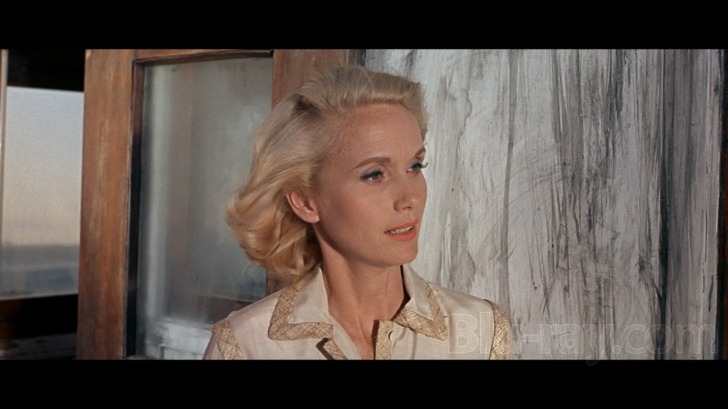
Exodus is presented on Blu-ray with an AVC encoded 1080p transfer in 2.34:1. Though shot in Super Panavision 70, Twilight Time has stated that the master provided by MGM-UA was sourced off of 35mm and was done in the mid-2000s. Both of those aspects may create some issues for some videophiles, but for anyone who suffered through the unabashedly lamentable MGM DVD release of this film, the results here are often quite commendable, if also problematic at times. The DVD was such a botch job that I literally used to use it to show those new to the then "high tech" medium what artifacts like moiré and aliasing looked like. There are few if any of those distractions on display now, but the elements used for this transfer still have their fair share of age related wear and tear, including splotches, scratches and nicks. There are also recurrent issues with density and color temperature, probably more so in the early going than later on (watch the hues of the sky in the brightly lit outdoor scenes and the changes in palette, while slight, are unmistakable). Preminger and editor Louis R. Loeffler use a lot of optical dissolves throughout the film, and those can look a bit ragged and understandably "dupe" like a lot of the time. The overall palette is rather well represented here, if slightly faded looking, though I personally would have liked a bit more saturation and pop to the visuals, especially the outside scenes. Some dimly lit interior moments, like the chilling sequence where Dov confesses his duties at Auschwitz, provide reasonable but never overwhelming levels of shadow detail. My bottom line hunch is those with a history with the DVD will find this presentation more than adequate, while those coming to the film for the first time will probably find more to nitpick about.
Exodus Blu-ray Movie, Audio Quality 
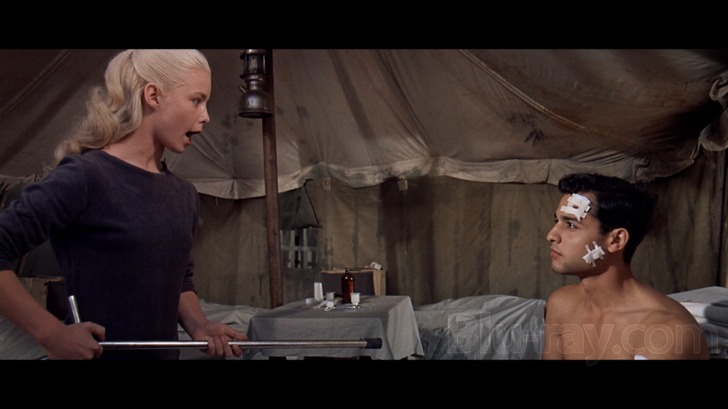
Twilight Time's new(ish) website has two superb articles by Mike Matessino detailing the rigors of upgrading Exodus' soundtrack for Blu- ray release (the articles can be found here and here). The Blu-ray offers quite an assortment of audio options, with DTS-HD Master Audio 5.1, DTS-HD Master Audio 4.0 and DTS-HD Master 2.0 tracks, along with an isolated score and effects track presented in DTS-HD Master Audio 2.0. Matessino's efforts were seemingly heroic, but I'm a little sad to report that I personally found both the 5.1 and 4.0 mixes pretty boxy sounding, with what sounds like slight phasing or reverb issues. Dialogue seems mixed low on the 5.1 track, but is somewhat brighter or more forward on the 4.0 track. I experienced very minor but noticeable synch issues at times which may indicate conforming problems or something more mundane like inartful ADR. While not optimal, at least for audiophiles wanting an immersive listening experience, I personally found the 2.0 track to be the best sounding of the bunch. The boxiness in Gold's sweeping cues is largely absent, and dialogue is prioritized extremely well. It's a little distressing that Exodus's iconic soundtrack was so shoddily preserved for so long, and the commendable efforts made to restore it to something approaching its original glory should not be undervalued. That said, there are still problems which evidently couldn't be easily overcome in this audio presentation. As with the video element, there's an undeniable upgrade being offered, but things are still not optimal.
Exodus Blu-ray Movie, Special Features and Extras 
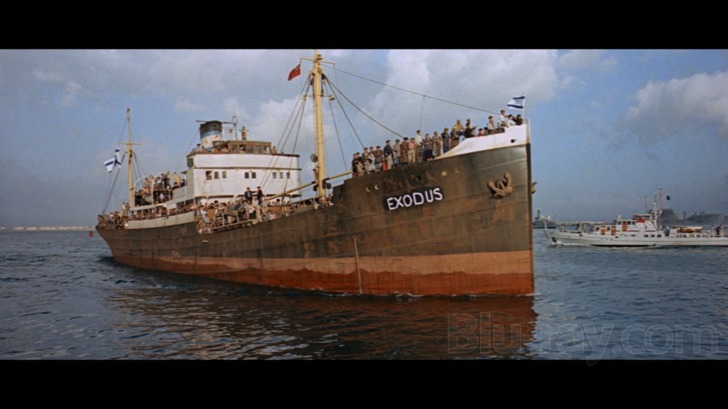
- Original Theatrical Trailer (1080p; 2:49)
- MGM 90th Anniversary Trailer (1080p; 2:06)
- Isolated Music and Effects Track is presented in DTS-HD Master Audio 2.0.
Exodus Blu-ray Movie, Overall Score and Recommendation 
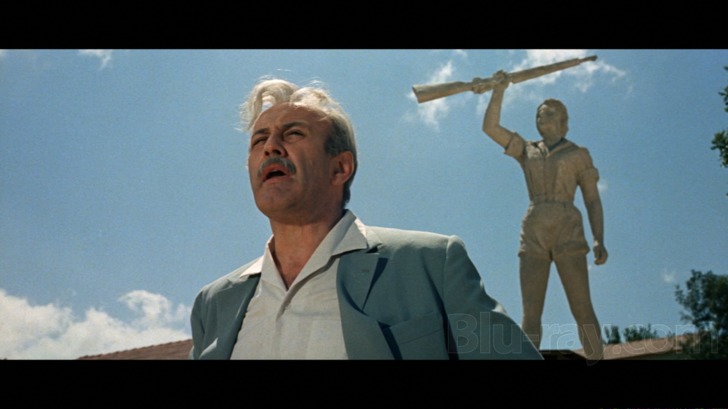
Exodus is undeniably a product of its time, but it's a film which just as undeniably helped to shape its time. Seen now through the prism of the intervening decades of Arab-Israeli conflict and increasing terrorism, the film can seem downright quaint and perhaps even potentially offensive in some of its formulations, but it has emotion to spare and Preminger's typical mastery of sweep and dramatic momentum. Exodus has suffered for years with less than spectacular home video offerings. This new Blu-ray offers significant upgrades in video and audio, but there are still issues in both presentations which may raise the hackles of some. It would be wonderful if some deep pocketed benefactor could spring for a complete restoration, optimally off of the large format original. I've had a soft spot for this film since my early childhood, despite its over length, amped up histrionics, and historical inaccuracies, so I'm simply pleased to be able to see and hear it in something approaching reasonable condition. Recommended.
Similar titles
Similar titles you might also like

The Lighthorsemen
1987

Das Boot
The Director's Cut | Single-Disc Edition
1981

The Way Back
2010

Tora! Tora! Tora!
1970

Roots
2016

9th Company
9 rota | Collector's Edition
2005

Roots: The Complete Original Series
1977

The Killing Fields
1984

Breaker Morant
1980

Gods and Generals
Extended Director's Cut
2003

Flags of Our Fathers
2-Disc Special Edition
2006

The Longest Day
1962

Battle of the Bulge
1965

Glory 4K
1989

A Bridge Too Far
1977

The Captain
Der Hauptmann
2017

Fat Man and Little Boy
1989

Cast a Giant Shadow
1966

Army of Crime
L'armée du crime
2009

The Guns of Navarone
1961